5 Lessons I’ve Learned Breastfeeding
We’re told that breastfeeding is “natural,” but that isn’t always the case. Breastfeeding is a privilege I’m honored to have, but it’s not easy and wasn’t so “natural” for me at first, so let’s talk about it! Here are 5 Lessons I’ve Learned Breastfeeding…
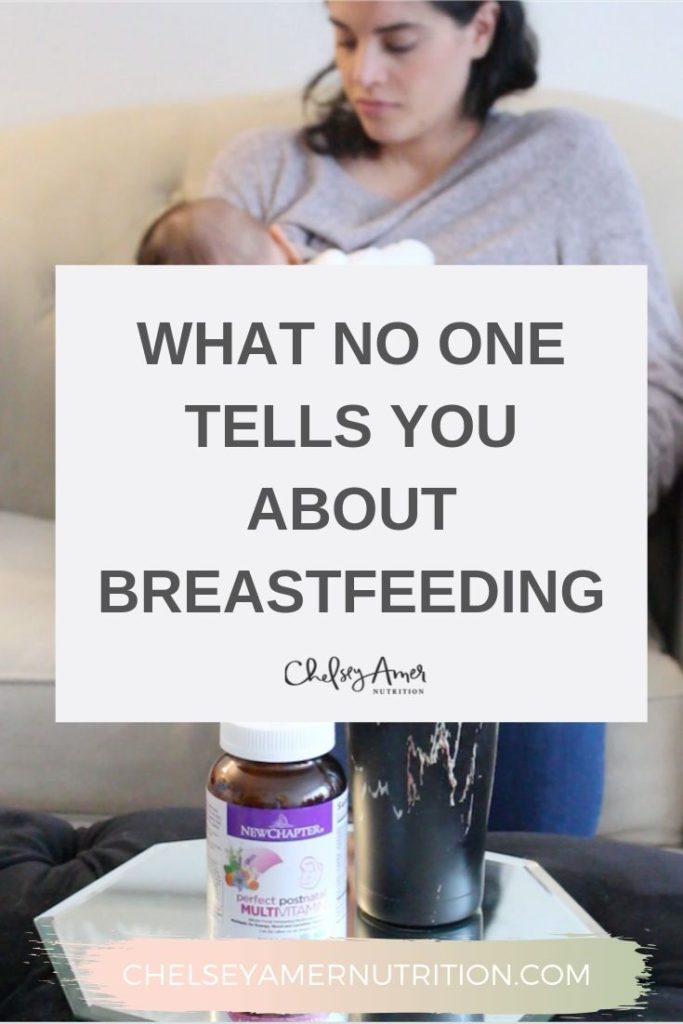
Disclaimer: This post is sponsored by New Chapter. Thank you for supporting the brands that make the Chelsey Amer Nutrition blog possible!
Let’s talk about one of the most demanding aspects of new motherhood and what’s on my mind (nearly) 24/7… BREASTFEEDING!
If you’re an expectant mama or breastfeeding yourself, I hope you find reading about my experience reassuring… because where there’s a will there’s a way! But it takes support and commitment, plus a few right steps early on.
When I was pregnant, I knew I wanted to breastfeed our babe. It never really crossed my mind to rely on formula first. As a dietitian who extensively studied maternal and child nutrition in grad school, I knew too much about the benefits not to try.
Now, NO JUDGMENT if it’s not for you. I really do believe that FED IS BEST! One of the biggest lessons I learned along my four-month journey is that breastfeeding takes serious commitment. There have been so many times that I thought “I should just give up…” But it was so important to me to continue.
Before I share the lessons I’ve learned, here’s my breastfeeding story…
The First Few Feeds
I delivered our babe in a breastfeeding-friendly hospital. They encouraged early skin-to-skin contact and breastfeeding as soon as your child was delivered and healthy. So after laboring for over 24 hours and then pushing for 3 ½, I was ready. I whipped off my sports bra I was wearing throughout delivery and was ready to go. (Side note – I’m pretty sure everyone who came to visit us at the hospital saw my boobs because I felt like I was always feeding my son 24/7 in those first few days!)
My son, Lex, was alert right from birth and quickly found his way to my boob. I could see the colostrum (the first form of milk before your true milk comes in) I was producing (luckily production wasn’t an issue early on!), and knew he was getting something from me (which is SO reassuring). That first feeding didn’t hurt or even feel weird. Sure, the nurses were grabbing my boob to help, but it all felt 100% natural, even if I needed some help. I was instantly in love with my son and nursing him as a way to bond.
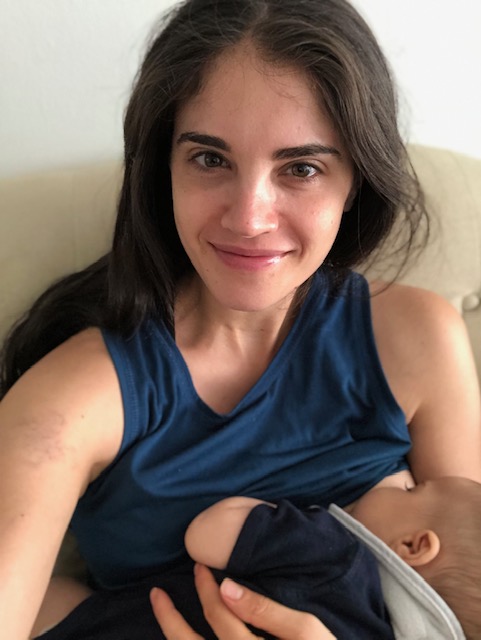
On day 2, however, Lex started clamming down on my nipple. I tried to follow the advice of several lactation consultants in the hospital, but his latch looked OK from the outside.
And then the cluster feeding began. From 4pm-12am he was feeding every hour. I felt like a cow. Now not to be graphic, but my nipples were cracked, sore, blistering, and almost bleeding. Every feeding was painful, but I pushed through because I was determined… but I also knew that I needed help.
I was exhausted after a long childbirth experience and feeding a ravenous baby, so the last thing I was thinking about was my nutrition. Thank goodness I knew I was getting the nutrients our babe needed from my postnatal vitamins – but more on this later!
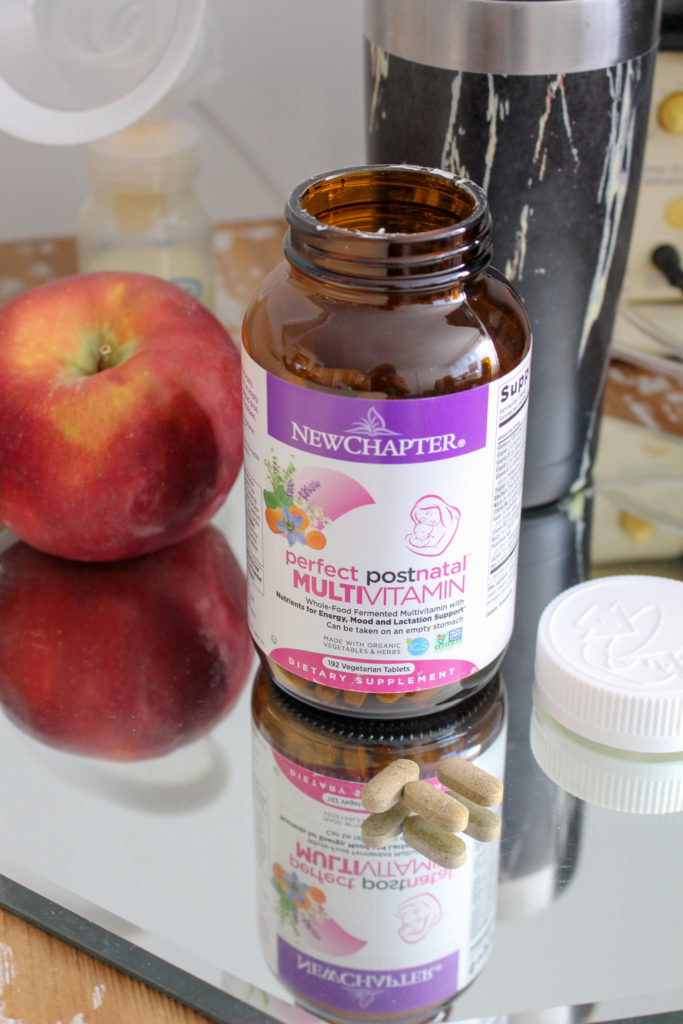
By day 3, I knew I wasn’t going to be able to sustainably breastfeed like this. An hour before we were discharged from the hospital, an amazing nurse finally listened to the feeding concerns I had, and took time with me to help us resolve them.
She called in the big guns – a lactation consultant – who after evaluating what was going on recommended I take 24 hours off breastfeeding and pump instead. She suggested I rent a hospital-grade (stronger) pump to give my nipples a break and give Lex my pumped milk in a bottle. This sounds basic but I was so overwhelmed (and hormonal), and was hysterical. She also recommended an in-depth, at-home visit with a lactation consultant.
When we got home, my husband ran to the store to get the pump, some formula (in case I wasn’t pumping enough), and everything we needed to feed our babe.
The next 36 hours of exclusively pumping helped my body heal, but I was distraught. Lex did not take a bottle well, was spitting up like crazy, and I felt like a total failure. “If I can’t even feed my son, what kind of mom am I?” We gave him some formula for two feeds and it broke my heart that my body couldn’t work properly for our little guy. Looking back, it wasn’t a big deal. My child needed fuel and my body took some time to catch up – but it wasn’t easy in a sleep-deprived and hormonally charged state. After a day or two, my milk came in (it takes a few days, which is something I never knew!), we didn’t need formula anymore, and my boobs felt better. Things were looking up!
Our Visit with the Lactation Consultant
Some of the best $400 I ever spent was on our 90-minute in-home visit with a lactation consultant. She was so calm, patient, and understanding of my emotions and frustration. She gave me the pointers we needed to improve his latch and there was a definite improvement in our feeds. I wasn’t as stressed going into each feed, which also helped the overall experience and my supply.
Moving forward…
Over the next few weeks, we found our rhythm. Feeds weren’t always easy and there are definite times I needed to readjust his latch and pay attention, but I absolutely loved nursing. In fact, even 4 months later, I usually prefer breastfeeding to pumping and bottle feeding (the hassle of cleaning bottles just isn’t worth it to me).
Regulating My Supply
It’s normal for your milk to come in around day 4 or 5. For me, my milk fully came in around day 5. Luckily, supply wasn’t a concern early on. In fact, it took quite some time for me not to feel engorged, so I happily built up my freezer stash using these freezer bags.
One of the coolest parts of breastfeeding is how your supply regulates to your child’s needs. At first, Lex was feeding every 2-3ish hours, around the clock. By about one month old, he was eating just once overnight. For a while I was also pumping once overnight “in case he needed that feed again,” but eventually I dropped it.
My body quickly adjusted again when he stopped eating overnight around weeks 10-12. I tried my best to follow his cues and let my breastmilk adjust. It’s still a work in progress weeks later, and I’m noticeably fuller in the morning than the evening, but it’s working just fine!
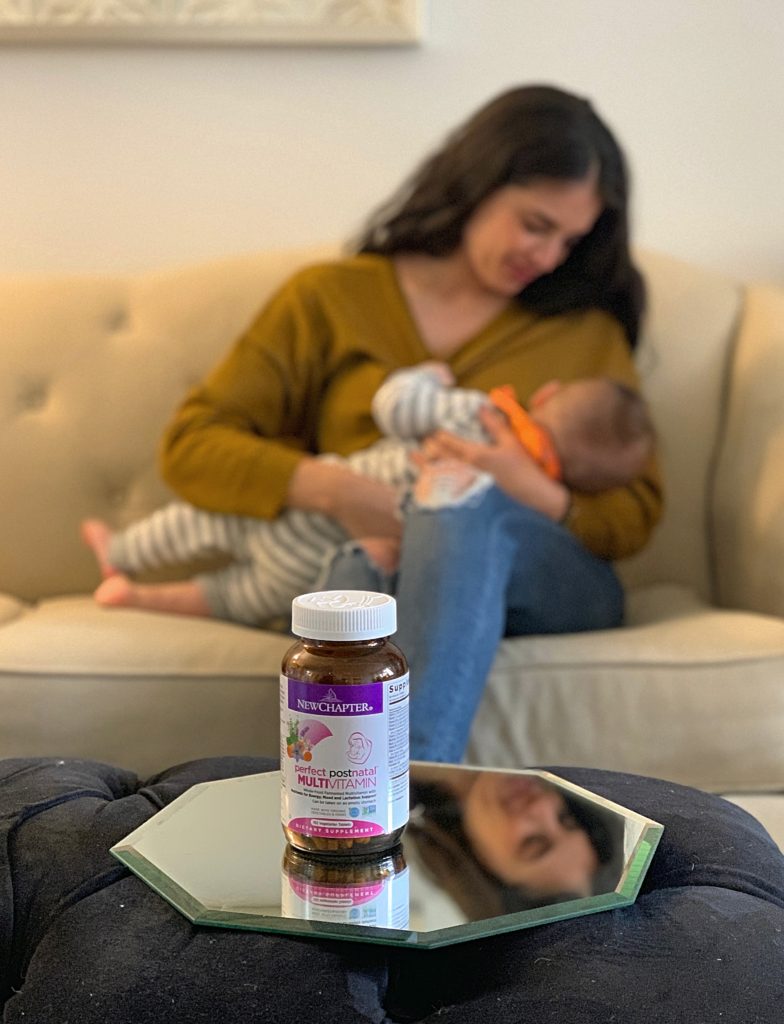
5 Lessons I’ve Learned Breastfeeding
Over the past 19 weeks as a new breastfeeding mom, I’ve learned plenty of lessons that I want to share with other new moms who may be equally frustrated, hormonal, emotional, anxious, or curious. Most of this is from my own experience (I’m not a lactation consultant or breastfeeding expert), but if it can help one new mom, then I’ll be happy!
1. Focus on Your Nourishment
Did you know that your body needs more calories when breastfeeding than you did when pregnant? That’s right… you need MORE energy to produce milk and feed your tiny human than you did when you were growing said tiny human. It’s amazing!
Watching my son grow from 7 pounds and change to over 15 pounds [at his 4-month checkup], almost exclusively from my breastmilk was incredible. MY body did that (how amazing are women?!).
BUT it took hard work. I made sure to eat, eat, eat! And that sounds like fun, but it wasn’t always easy. Because eating enough – and the right foods – meant that my post-pregnancy pooch (that little tire around my belly) wasn’t going anywhere. But for the sake of feeding my child, I thought it was worth it! Also, you’re busy as a new mom, and it’s sometimes hard to make time to eat. Prepping food in advance was so helpful!
Everyday, I make sure to eat…
PROTEIN: Pregnancy and childbirth are hard work, so it’s essential to repair your body after. Protein helps rebuild muscles (your uterus is a muscle!) and promotes satiety, so including a source at every meal is essential. Nursing mothers need an additional 25 grams/day!
OATS: Although there’s a lack of REAL scientific evidence about oats as a “galactagogue” (substance that increases milk supply), there’s certainly anecdotal evidence, they’ve been used for years by breastfeeding women, and every single lactation cookie recipe uses oats. So, when my supply started to dip a bit, I obviously reached for oats and I swear it helped. I don’t know if it was the placebo effect or an increase in carbohydrates or calories, or just that it was comfort food so it calmed me down, but I think it worked! I made my banana bread and oatmeal cookies on repeat! Even more, my postnatal vitamin (see below) includes oats as part of a blend of botanicals traditionally used by breastfeeding women.
GREEN VEGGIES: Not only are taste preferences passed through your breastmilk (and I’d love it if my son asks for veggies one day!), but green vegetables are especially full of nutrients. From iron (an essential nutrient for new moms!) to antioxidants, I aimed for at least 1 serving of greens daily.
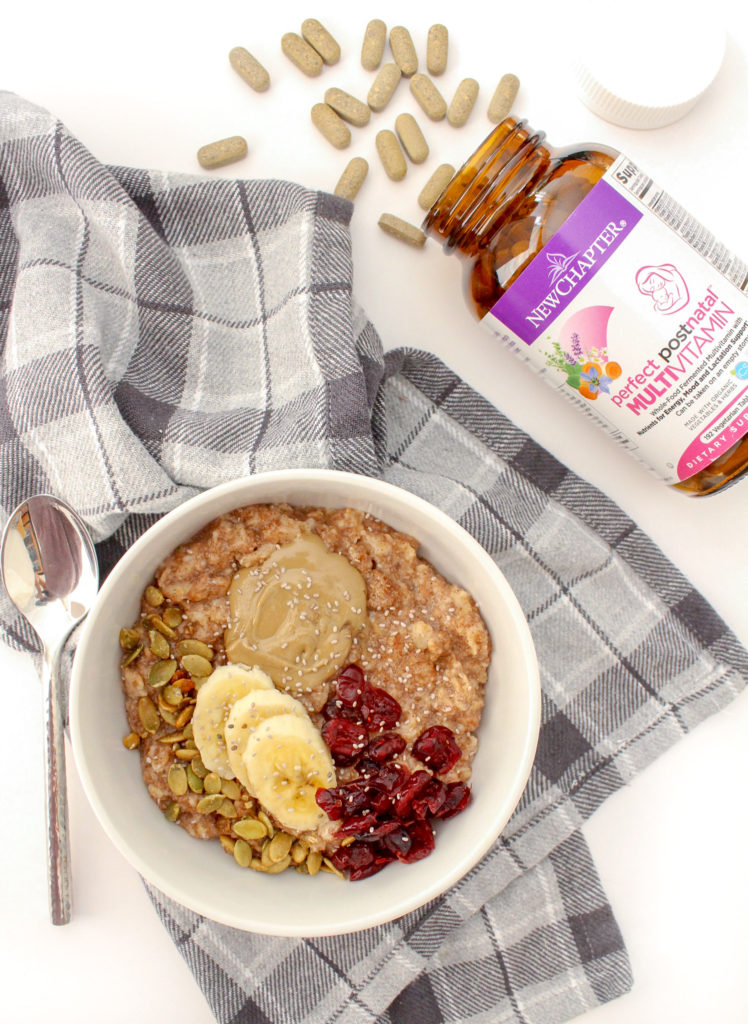
2. Don’t Stop Taking Your Vitamins
As a dietitian, I feel confident sharing this one because I’ve heard from so many other new breastfeeding moms that they became lax with their vitamins. You still need them when breastfeeding!!!
Your body is incredible, but your postpartum diet is likely not perfect, so consider your vitamins your 100% necessary insurance policy. Personally, I’m always a fan of a multivitamin during extra hectic times, and postpartum and breastfeeding definitely counts!
My prenatal vitamin of choice was from New Chapter (I loved the whole food ingredients and ginger addition to help combat nausea), so I stuck with it postnatal.
After a few weeks of continuing New Chapter’s prenatal vitamin, I switched to their Perfect Postnatal Multivitamin. It’s a food-based vitamin that’s made with organic vegetables and herbs and fermented for better absorption.
Specifically, New Chapter’s Perfect Postnatal contains:
- Fermented iron to help replenish your body after birth (and blood loss)*
- B vitamins that are fermented to support optimal energy support (hello sleep deprivation!)*
- Vitamin D3, which many women are deficient in and is essential for your baby (Note: the American Academy of Pediatrics suggests supplementing vitamin D for breastfed babies. Mothers with adequate vitamin D status can pass some vitamin D to their babies via breastmilk. The CDC notes that taking a vitamin D supplement may not be enough and to supplement your child directly too.)
- Organic herbs and foods that support nursing, like oats, turmeric, and chamomile*
3. Expect Breastfeeding to Take Work
I think because I luckily had a rather uneventful pregnancy I expected breastfeeding to be the same way. HA! Jokes on me!
I knew breastfeeding would be a commitment (and like I said earlier, I truly believe you have to be COMMITTED and want to do it for it to work), but I didn’t know just how much work!
The good news is that most of the heavy lifting is upfront. Once we got in the groove of things, breastfeeding became much easier (my son even went on a bottle strike when I went back to work and would ONLY want to nurse!)
4. Know That It’s OK to Supplement, Pump, Or Exclusively Formula Feed
Like I mentioned, while pregnant, in my mind I was 100% breastfeeding, no questions asked. I didn’t fathom a need for formula. I would “push through the pain” and it would work out.
Well, it doesn’t always happen like that!
I think if I had told myself that it was OK to supplement, then I would have felt better when the time came. Instead I spent hours crying and beating myself up, which only made my postpartum recovery THAT much harder.
5. Create a Great Breastfeeding Nook
Breastfeeding is physically tough to maneuver in the beginning because babies need neck support and you likely need to support your breast as well. So, the last thing you want to do is sit down to feed your screaming baby and realize you’re absolutely parched or starving. That’s where prior preparation helps!
When home, I breastfeed on the left side our couch with the help of my breastfeeding pillow (I love this one!), and have all of my stuff I could need within arm’s reach.
Here’s what I have (and suggest you keep nearby too!):
- Water bottle
- Feeding log
- Your postnatal supplements
- Coffee (in the morning)
- Phone
- Snacks
- Vitamin D drops (for the baby)
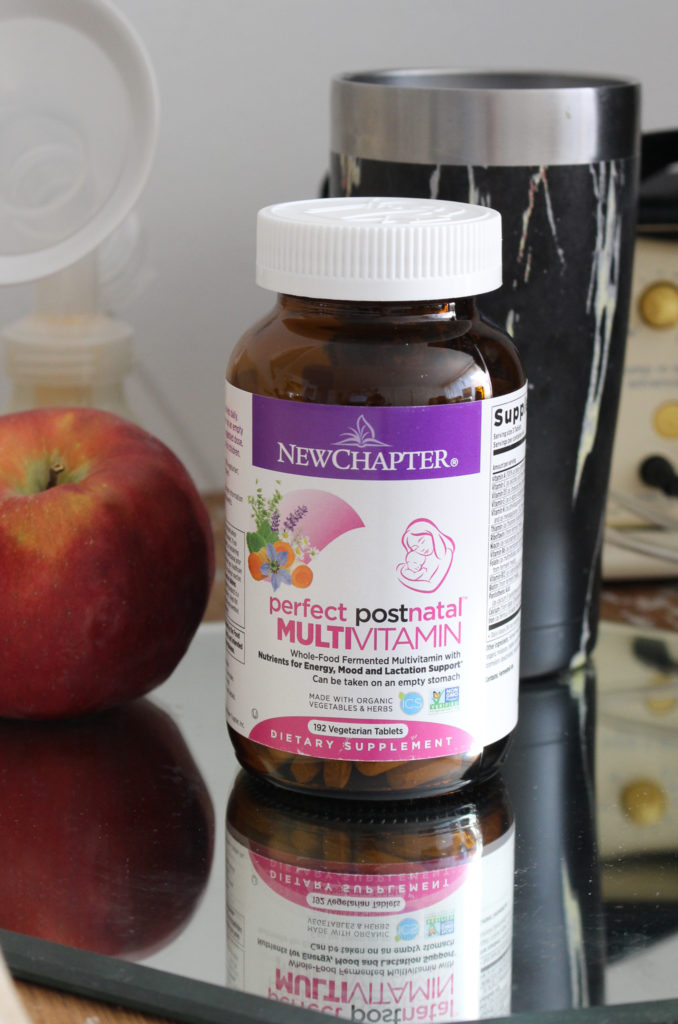
I hope reading about my experience helped normalize what you may go through or give you solace that even when it’s tough, it can work out! Sending you love and lots of newborn cuddles…
XO
Certified Organic by International Certification Services, Inc., Medina, ND, USA
*These statements have not been evaluated by the Food and Drug Administration. This product is not meant to diagnose, treat, cure, or prevent any disease


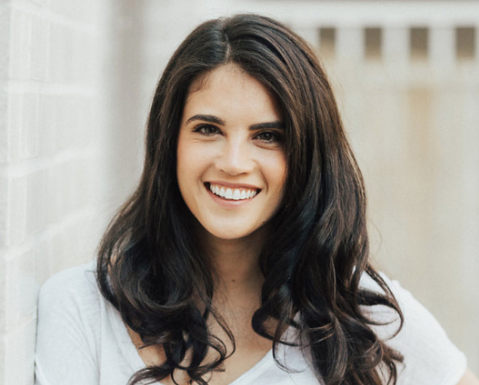 Hi there!
Thanks for stopping by! I'm Chelsey, an online Registered Dietitian, recipe developer, budding photographer, and coffee addict! My mission is to help you feel good through food by answering the question "What should I eat?" Let's make nutrition approachable!
I hope you enjoy my personal collection of simple, healthy, food allergy friendly and nutritiously delicious recipes, plus tips and tons of tricks that will help YOU live a nutritionally-balanced life! I look forward to getting to know you better...
Hi there!
Thanks for stopping by! I'm Chelsey, an online Registered Dietitian, recipe developer, budding photographer, and coffee addict! My mission is to help you feel good through food by answering the question "What should I eat?" Let's make nutrition approachable!
I hope you enjoy my personal collection of simple, healthy, food allergy friendly and nutritiously delicious recipes, plus tips and tons of tricks that will help YOU live a nutritionally-balanced life! I look forward to getting to know you better...







